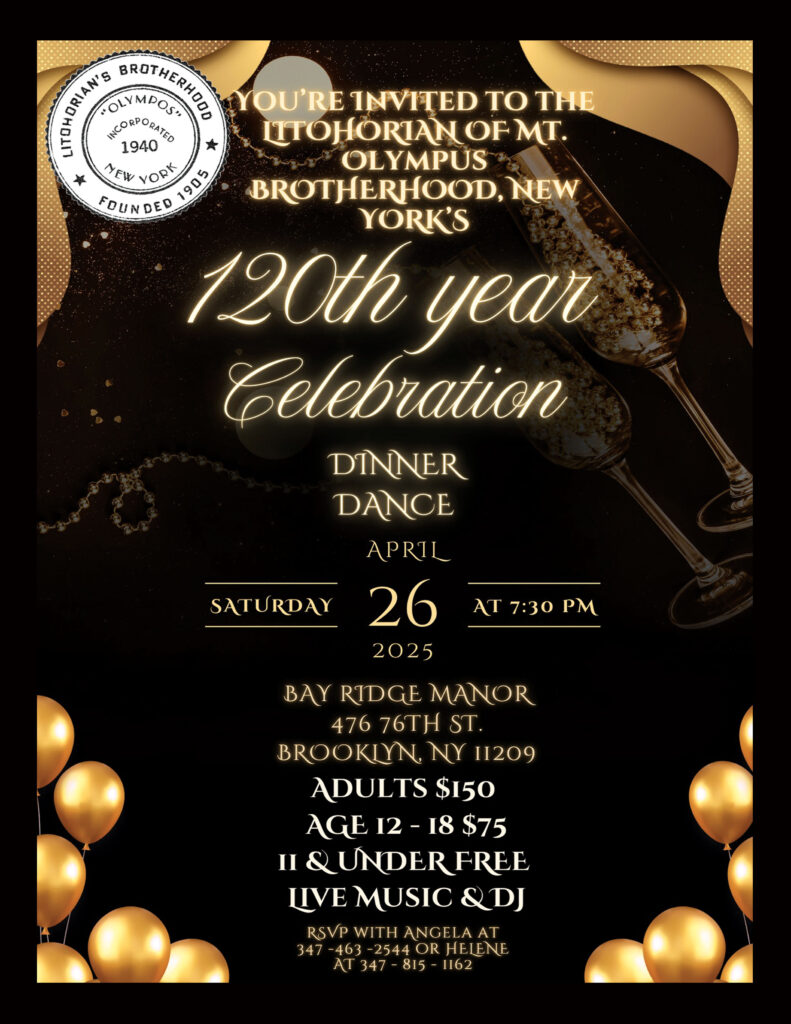Keeping It Greek in Motor City
Posted by estiator at 13 December, at 09 : 16 AM Print
Fighting for the soul of Detroit’s Greektown.
by Michael Kaminer
PHOTOS COURTESY OF GREEKTOWN NEIGHBORHOOD PARTNERSHIP
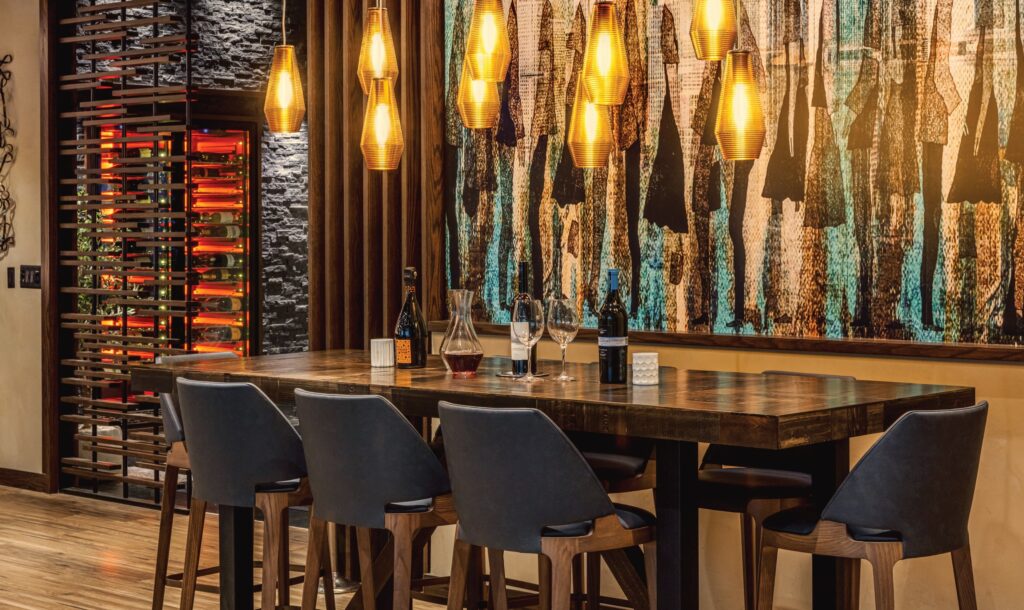
LIKE MANY GREEK TOWNS across North America, Detroit’s has become a little less Greek—and a lot more diverse—over the years. But unlike some others, Detroit’s Greek- town has embraced its multiple identities. In fact, it’s making them part of a growth story.
“Detroit’s Greektown is thriving, building, and growing, respecting its heritage of the past while building for future,” says Melanie Markowicz, executive director of the Greektown Neighborhood Partnership, a nonprofit “dedicated to the long-term economic and cultural vibrancy of Greek- town.” The district’s future “looks very bright, with both Greek business and developments that aren’t Greek in nature,” Markowicz says.
Among new and pending additions to the Greektown mix: The Exchange, a 16-story, 165-unit mixed- use tower with some of the neighborhood’s first residential construction in decades; improvements to Monroe Street, Greektown’s main drag, including expanded patio spaces, wide pedestrian lanes, and greening elements; development of the first public space in the district, the Plaza at Gratiot and Randolph, which will connect Greektown to the wider downtown core and drive pedestrian traffic into the heart of the neighbor- hood; and a rehabilitation of Second Baptist Church of Detroit, a historic Black church, whose restoration will be spearheaded by Markowicz’s organization.
To boot, the massive Hollywood Casino at Greek- town, which opened in 2000, just unveiled a $30 million renovation of its lobby, guestrooms, and common areas. The Pig’s Tail, an intimate, 45-seat rooftop cocktail bar within a large barbecue restaurant, opened last year.
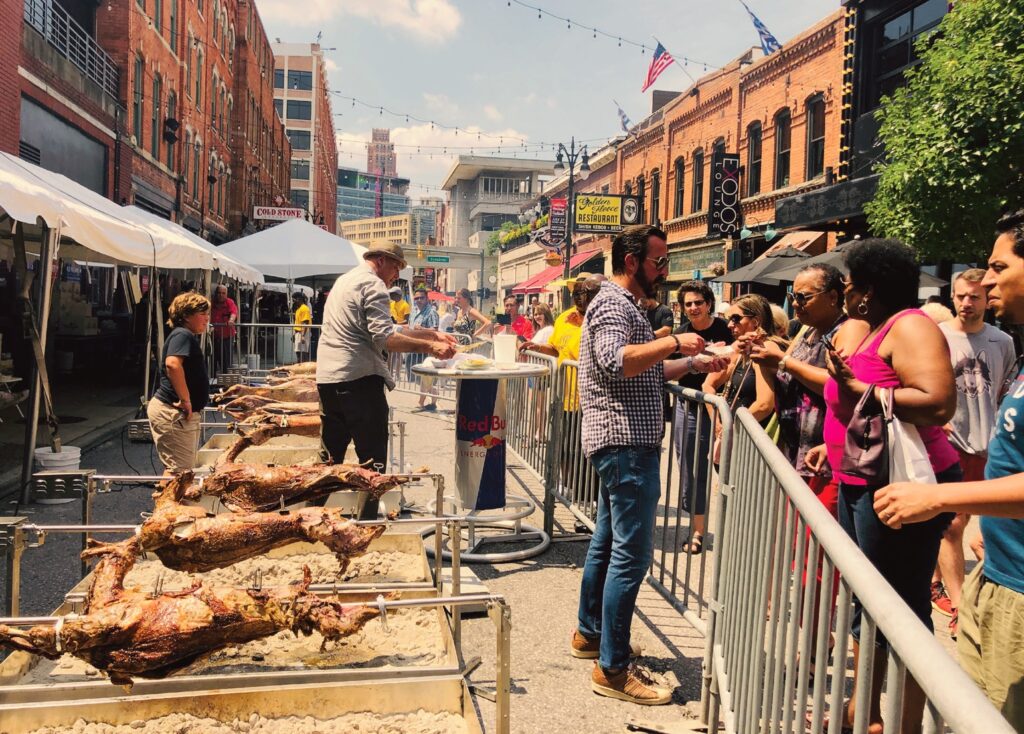
And the upscale Atheneum Suite Hotel and Conference Center, owned by the prominent local Papas family, just opened Symposia, a Mediterranean/Greek fine-dining restaurant. “Symposia will build on our commitment to preserving the cultural aspects of the area, as well as enhancing the community moving forward,” Athina Papas, a member of the clan and hotel executive, said in a press release.
Among the area’s Greek establishments, the Dionisopoulos family’s Golden Fleece restaurant underwent a “lovely rehabilitation” last year, Markowicz says. Golden Fleece is the longest-standing restaurant in Greektown. The same family recently opened Bakalikon, a 7,000-square-foot, all-day café, bar, and market offering exquisite food and drink imported from Greece.
But Yanni Dionisopoulos, a co-owner of Golden Fleece and Bakalikon—and the son of an original owner— sounded a more cautious note on Greektown’s outlook. “Coming out of the pandemic was a test of who could survive. Some of us did, some of us didn’t. As a Greek family business for more than 52 years, we felt an obligation to continue the legacy our fathers started— the longest-running legacy in Greektown,” he says.
“Greektown’s been a vibrant district for more than 100 years, and we always took pride in its being the safest,” Dionisopoulos tells Estiator. “With the turmoil of the last few years, a lot of businesses didn’t continue, and the kids didn’t take over. It became a place where history and culture don’t matter to some people. That’s affecting the general area.” Despite Markowicz’s rosy portrayal, “the city and city council do not have our backs,” Dionisopoulos says. “It would be good to get support from city and state officials—some respect as a minority neighborhood. In the early ’90s, when everyone was abandoning Detroit, we stuck around and fought hard. With a lot of developments now, we’ve been overlooked.”
And while diversity might sound good as a strategy for a Greek enclave, “they’ve tried that, and it was an epic fail,” he says. “We have to go back to Greektown’s roots. That’s what’s proven to be successful for decades. Chain restaurants, changing it up—that’s when things went downhill.”
For the district’s future, “I would love to see more people opening restaurants,” Dionisopoulos says. “I just purchased a bar, and I’m planning on giving it a Greek theme, with live Greek music and bouzouki nights. I hope that’s a good start for people to follow. There is proof that authenticity done right pays off. It’s that taste of Greece without the ocean and mountains.”
Restaurateurs like him share authenticity and a Greek spirit, Dionisopoulos says. “We remodeled Golden Fleece during the Covid shutdowns. We carry Greek wines. We sell more Greek beer than Budweiser. We’re helping people understand mastiha. We’re getting them to know rakomelo, a Greek moonshine with honey.”
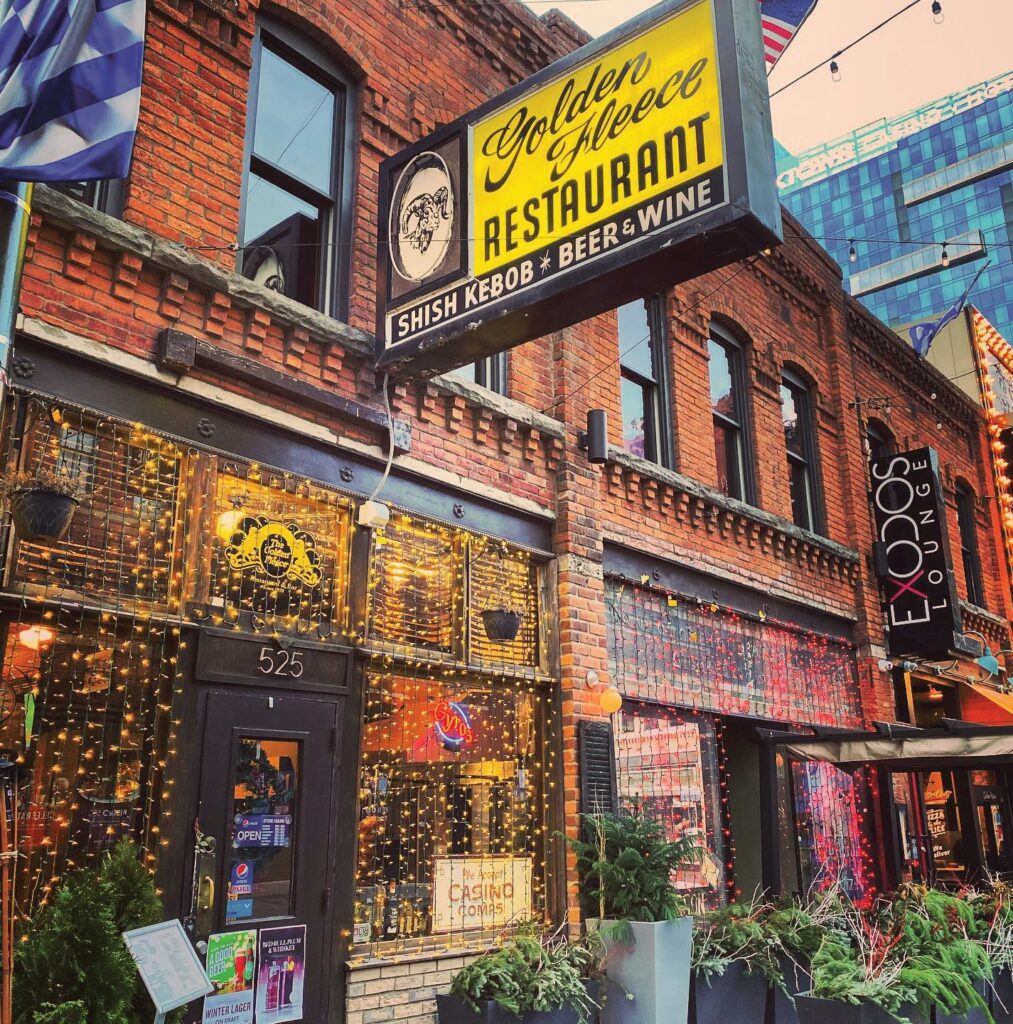
That spirit is key to survival, he contended. “Greektown has been a staple in this city for more than a century, and our goal is to make sure it’s around another 100 years, at least, for our kids. We’re investing our time, our money, and everything we have to make it a vibrant, safe, fun neighborhood.”
Located just northeast of the city core, on Monroe Avenue between Brush and St. Antoine streets, Greektown is one of the last surviving Victorian-era commercial streetscapes in downtown Detroit. Its evolution fits naturally with an inclusive approach, Markowicz explains.
We’re investing our time, our money, and everything we have to make it a vibrant, safe, fun neighborhood.” —MELANIE MARKOWICZ
“As we work on new projects, restaurants, and public spaces, it’s important that we explore and celebrate Greek heritage, but also the other heritages of the neighborhood. We have a German church, a Black church, and a Greek church all close to each other,” she explains.
“There is 200 years of history here, but the neighborhood was originally developed by German immigrants,” Markowicz says. In the early 20th century, part of Greektown included Black Bottom, a predominantly Black neighborhood demolished in the 1950s to make way for a freeway. The area also housed a synagogue in the 19th century.
In the early 1900s, the transition from Germans to Greeks happened “seemingly overnight,” according to the Greektown Detroit web site. Through the help of Theodore Gerasimos, the first documented Greek immigrant to Detroit in 1890, “newly arrived Greek immigrants began moving into the neighborhood and established businesses. Greek-inspired flourishes and details were applied to the German-built commercial buildings, carrying on a tradition in the neighborhood of thoughtfully customizing facades to suit business needs and celebrate cultural history,” the site explains.
“The area has always been about immigrant and migrant groups. It’s welcoming and authentic. And we maintain that today,” Markowicz says. “We’re welcoming to Detroiters, and we’re often the first experience in Detroit for visitors.”
Challenges aside, Markowicz remains ebullient about the Greektown strip. “Detroiters have fond memories of coming here as children. It holds this special place in everyone’s heart. I think they appreciate how important it is. And we’re really proud of having multigenerational; Greek families carry on the legacies of Greektown businesses.”
Family Ties
Athina Papas of the famed Greektown clan on what comes next.
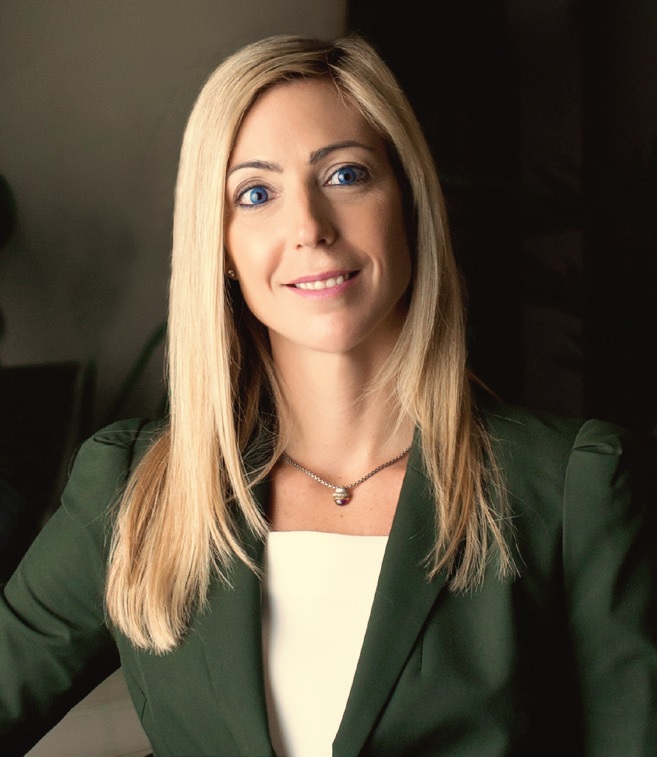
When it opened in 1992, the Atheneum Suites Hotel was an outlier— an upscale boutique hotel in a city that was suffering through decades of neglect and economic misery. Only two other high-end hotels operated in downtown Detroit at the time.
Thirty years later, Detroit has become a hip destination—and the 173-room Atheneum Suites has become a local institution. Its enviable Greektown location and Greek-modern ambiance has earned it a loyal following. And the family behind the hotel have become an even stronger force in the revitalization of Greektown.
“After Covid, business has been coming back too,” says Athina Papas, an executive at the all-suite hotel. “Occupancy has increased, and we’re getting more and more corporate meetings.” Her father, Greek immigrant Jim Papas, launched the Atheneum Suites, converting the former Ferry Seed Company warehouse into a coolly elegant property. “The bones of the building gives us structural beams that were turned into ornate columns, which adds to the Greek flair,” the younger Papas says.
The Papas family launched a multi- million-dollar renovation of the Atheneum Suites in September. Along with a refreshed lobby, the hotel unveiled Symposia, a fine-dining restaurant that uses Mediterranean cuisine as a springboard for creative fusion cui- sine. “We have a chef who’s trained in classical French techniques,” Papas says. “He’s starting with undertones of Greek cuisine but adding Spanish, Italian, and French elements. We wanted to add a unique dining experience to Greektown without necessarily having to make it straightforward Greek.”
Along with its design and cuisine, the hotel’s location has bolstered its success, Papas says. “It’s a strategic location, with a lot of attractions and venues within walking distance.” The Music Hall Center for the Performing Arts, a major performance space, is just a few minutes north on foot; the Hollywood Casino at Greektown is a few blocks east; and Monroe Street, Greektown’s heart, is at the hotel’s doorstep.
The Papas family’s story “is the American dream,” Papas says. Her father, who grew up near Athens, came to Michigan at age 18 “and started working as a painter,” she says. “But he met some people, found a business partner, and opened a very small restaurant.”
A few years later, Jim Papas opened Pegasus Taverna, a beloved Detroit mainstay for more than four decades. A successful Pegasus Taverna satellite opened in suburban St. Clair Shores in 2010. The family also controls a range of real-estate holdings in the city, Athina Papas says. Today, Papas and her sister Stella are involved in the Atheneum Suites business; their other three siblings have gone off in their own directions.
Now the family is focused on the future of Greektown itself. Athina Papas is president and board chair of the Greektown Neighborhood Partnership, the nonprofit “dedicated to the long-term economic and cultural vibrancy of Greektown.”
A married mother of two, Papas is bullish on the district’s prospects. “The outlook is really positive for Greektown,” she says. “The number-one debate is how Greek it has to be to survive. We have four families that have generational ownership, and we’re all involved. We know we have to take advantage of and continue our cultural heritage, show it to people, and allow them to enjoy it. But we also have to change and evolve as the city has changed and evolved.”
The neighborhood, she says, “is at a crossroads. All of the new development projects will allow us more flexibility to showcase our culture in different ways. The truth is we do have to diversify, a bit. But one of our biggest strengths is our heritage and culture—offering Greek outlets in Greektown makes sense.”
And while some of the area’s beloved restaurants did not survive the pandemic, “we may find a silver lining by offering a few things that aren’t Greek and giving people reasons to stay in the district,” Papas says. “A well-curated street will attract people, and that might include small stores or an art gallery, but not necessarily a food and beverage outlet.”
Among Greektown’s merchants, “there are mixed feelings right now,” Papas says. “It’s an evolution. I’ve been really encouraged by the support of the city and from our partners who own other businesses. We have four strong families with the next generation who’ll be taking over the helm. It gives me hope that we’ll be able to build a stronger Greektown for my kids.”



